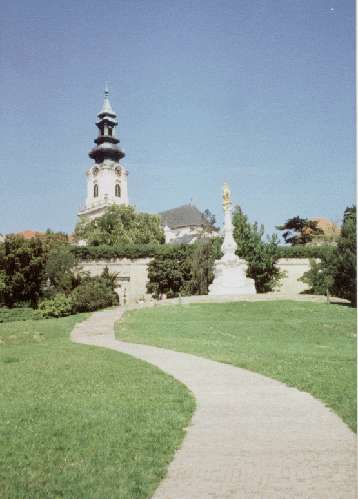Wiching on:
[Wikipedia]
[Google]
[Amazon]
 Wiching or Viching"Wiching", '' :sk:Encyklopédia Slovenska'' () was the first
Wiching or Viching"Wiching", '' :sk:Encyklopédia Slovenska'' () was the first
 Wiching or Viching"Wiching", '' :sk:Encyklopédia Slovenska'' () was the first
Wiching or Viching"Wiching", '' :sk:Encyklopédia Slovenska'' () was the first bishop of Nitra
The Diocese of Nitra ( sk, Nitrianska diecéza; la, Dioecesis Nitriensis; hu, Nyitrai egyházmegye) is a Roman Catholic diocese western Slovakia, with its seat in Nitra. , the bishop is Viliam Judák.
History
The diocese was created as the f ...
, in present-day Slovakia
Slovakia (; sk, Slovensko ), officially the Slovak Republic ( sk, Slovenská republika, links=no ), is a landlocked country in Central Europe. It is bordered by Poland to the north, Ukraine to the east, Hungary to the south, Austria to the ...
.
Life
He served between 880 and 891 AD. Wiching was originally aBenedictine
, image = Medalla San Benito.PNG
, caption = Design on the obverse side of the Saint Benedict Medal
, abbreviation = OSB
, formation =
, motto = (English: 'Pray and Work')
, found ...
monk
A monk (, from el, μοναχός, ''monachos'', "single, solitary" via Latin ) is a person who practices religious asceticism by monastic living, either alone or with any number of other monks. A monk may be a person who decides to dedica ...
from Swabia. After 874, he served Svatopluk I. From 874 to 879 he worked with John of Venice. At the end of 879 he was appointed a bishop of Great Moravia
Great Moravia ( la, Regnum Marahensium; el, Μεγάλη Μοραβία, ''Meghálī Moravía''; cz, Velká Morava ; sk, Veľká Morava ; pl, Wielkie Morawy), or simply Moravia, was the first major state that was predominantly West Slavs, Wes ...
, after St Methodius, and in 880 visited the Pope
The pope ( la, papa, from el, πάππας, translit=pappas, 'father'), also known as supreme pontiff ( or ), Roman pontiff () or sovereign pontiff, is the bishop of Rome (or historically the patriarch of Rome), head of the worldwide Cathol ...
in Rome
, established_title = Founded
, established_date = 753 BC
, founder = King Romulus ( legendary)
, image_map = Map of comune of Rome (metropolitan city of Capital Rome, region Lazio, Italy).svg
, map_caption ...
, who made him Bishop of Nitra
The Diocese of Nitra ( sk, Nitrianska diecéza; la, Dioecesis Nitriensis; hu, Nyitrai egyházmegye) is a Roman Catholic diocese western Slovakia, with its seat in Nitra. , the bishop is Viliam Judák.
History
The diocese was created as the f ...
. He was known for accusing the Saints Cyril and Methodius
Cyril (born Constantine, 826–869) and Methodius (815–885) were two brothers and Byzantine Christian theologians and missionaries. For their work evangelizing the Slavs, they are known as the "Apostles to the Slavs".
They are credited wi ...
of heresy
Heresy is any belief or theory that is strongly at variance with established beliefs or customs, in particular the accepted beliefs of a church or religious organization. The term is usually used in reference to violations of important religi ...
for holding Divine Liturgy
Divine Liturgy ( grc-gre, Θεία Λειτουργία, Theia Leitourgia) or Holy Liturgy is the Eucharistic service of the Byzantine Rite, developed from the Antiochene Rite of Christian liturgy which is that of the Ecumenical Patriarchate of C ...
in Old Church Slavonic
Old Church Slavonic or Old Slavonic () was the first Slavic literary language.
Historians credit the 9th-century Byzantine missionaries Saints Cyril and Methodius with standardizing the language and using it in translating the Bible and other ...
instead of the standard Latin
Latin (, or , ) is a classical language belonging to the Italic branch of the Indo-European languages. Latin was originally a dialect spoken in the lower Tiber area (then known as Latium) around present-day Rome, but through the power ...
of the Roman Church.
Wiching was a counselor for Svätopluk I and the only known suffragan
A suffragan bishop is a type of bishop in some Christian denominations.
In the Anglican Communion, a suffragan bishop is a bishop who is subordinate to a metropolitan bishop or diocesan bishop (bishop ordinary) and so is not normally jurisdiction ...
of Archbishop Methodius. Wiching was notorious for his disputes with St. Methodius. He remained in Rome and sent to king Svätopluk an allegedly forged letter from the pope, which caused Svätopluk to unseat Methodius. In 881, Methodius learned from the Pope about the forgery and appealed to the Pope, who deposed Wiching.
In 885, shortly before Methodius' death, Wiching left Poland and with the consent of Svatopluk went to Rome, where he falsely accused Methodius to the new Pope, Stephen V who issued papal bull ''Quia te zelo fidei'' forbidding the Slavonic liturgy. During the summer of 885, when the Pope learned of the death of Methodius, he named Wiching once again as bishop of Nitra and, in addition, gave him the title of Ecclesiastical Administrator. Wiching used this position to expel Methodius' students.KOVÁČ, Dušan, et al. Kronika Slovenska : od najstarších čias do konca 19. storočia. (Bratislava : Fortuna Print, 1998). p101 In 891/892, he left Svatopluk to serve Arnulf of Carinthia with whom Svatopluk was having a conflict. Wiching was part of the delegation sent to Svatopluk to negotiate peace. After Arnulf of Carinthia died, and with the fall of Great Moravia
Great Moravia ( la, Regnum Marahensium; el, Μεγάλη Μοραβία, ''Meghálī Moravía''; cz, Velká Morava ; sk, Veľká Morava ; pl, Wielkie Morawy), or simply Moravia, was the first major state that was predominantly West Slavs, Wes ...
, Wiching withdrew from public life. He died between 900 and 912, likely on September 12.
References
Further reading
* * 9th-century bishops {{bishop-stub